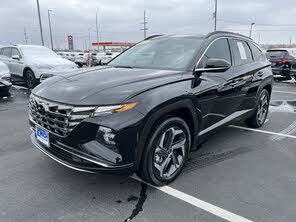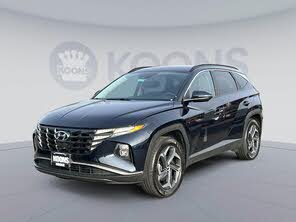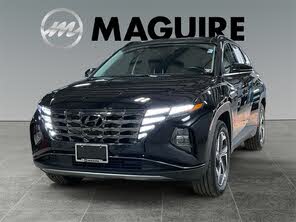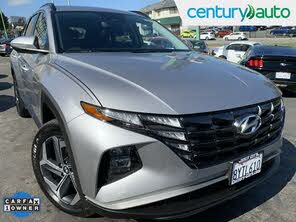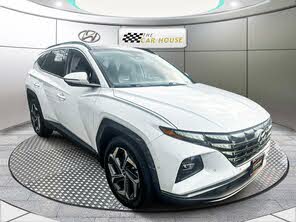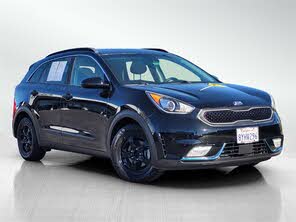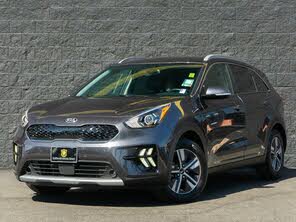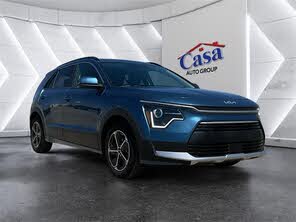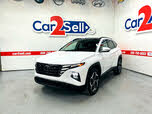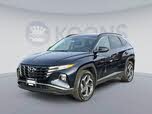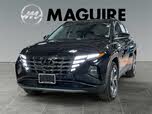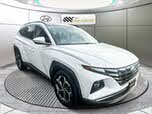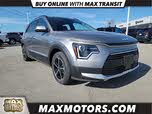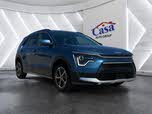Kia Niro Hybrid Plug-In vs Hyundai Tucson Hybrid Plug-In
2022 Hyundai Tucson Hybrid Plug-In for Sale
Shop Now2023 Kia Niro Hybrid Plug-In for Sale
Shop NowOverview | |
MSRP$33,840 | MSRP$34,900 |
Average price$24,046 | Average price$35,706 |
Listings875 | Listings1380 |
Ratings & Reviews | |
User Reviews | User Reviews |
Expert reviews7.2 out of 10 | Expert reviews7.5 out of 10 |
Pros
| Pros
|
Reviews SummaryThe Kia Niro gets redesigned for 2023 model year, but keeps its trifecta of hybrid, plug-in hybrid, and all-electric powertrains. With the demise of its Hyundai Ioniq (not to be confused with the Ioniq 5) cousin, the Niro is now the only vehicle sold in the United States with those three powertrain options, ranging from a traditional hybrid to a fully electric vehicle. The second-generation 2023 Kia Niro PHEV plug-in hybrid gets the same updates as its Kia Niro Hybrid and Niro EV siblings (which we’ll cover in separate reviews), including dramatic new styling and a revamped interior, plus more power and electric range than the previous-generation Niro PHEV, which dated back to the 2018 model year. The plug-in hybrid market has shifted a bit since that first-generation Niro PHEV was launched. That version was considered significant because it wasn’t derived from a non-electrified model, but that no longer seems to be a priority for automakers or customers. Aside from the Toyota Prius Prime, most mainstream plug-in hybrids are now variants of existing crossovers, such as the Ford Escape PHEV, Hyundai Tucson Plug-In Hybrid, Mitsubishi Outlander Plug-In Hybrid, and Toyota RAV4 Prime—as well as Kia’s own Sportage PHEV. So the question for the 2023 Niro PHEV is, with plug-in hybrid versions of familiar crossover models now available, does a dedicated design still matter? | |
Reviews SummaryAs if its 2022 redesign wasn’t dramatic enough, Hyundai has added hybrid and plug-in hybrid powertrains to the all-new Tucson. With an estimated 33 miles of all-electric driving range, the Tucson PHEV looks like a slam-dunk option for folks shopping in the compact crossover market. How it performs in cold weather, however, may be enough to send shoppers looking at other options. | |
No video found | |
Popular Features & Specs | |
Engine | Engine1.6L 261 hp I4 Hybrid |
Drive Train | Drive TrainAWD |
Seating Capacity5 | Seating Capacity5 |
Horsepower | Horsepower261 hp @ 2100 rpm |
EV Battery Capacity11.1 kWh | EV Battery Capacity13.8 kWh |
MPG City | MPG City87 |
MPG Highway | MPG Highway74 |
Battery Charge Time (120V)8.75 hours | Battery Charge Time (120V) |
Battery Charge Time (240V)2.25 hours | Battery Charge Time (240V)2 hours |
Engine | |
Engine Name1.6L 180 hp I4 Hybrid | Engine Name1.6L 261 hp I4 Hybrid |
Torque195 lb-ft @ 4000 rpm | Torque |
Horsepower180 hp @ 5700 rpm | Horsepower261 hp @ 2100 rpm |
Battery Charge Time (120V)8.75 hours | Battery Charge Time (120V) |
Battery Charge Time (240V)2.25 hours | Battery Charge Time (240V)2 hours |
DrivetrainFWD | DrivetrainAWD |
Fuel Economy | |
EV Battery Capacity11.1 kWh | EV Battery Capacity13.8 kWh |
MPG City | MPG City87 |
MPG Highway | MPG Highway74 |
Interior | |
Seating Capacity5 | Seating Capacity5 |
Key Features | |
Navigation SystemStandard | Navigation System |
Dimensions & Capacity | |
Cargo Space19.4 cu ft | Cargo Space31.9 cu ft |
Curb Weight3336 lbs | Curb Weight4081 lbs |
Height60.8 in | Height65.6 in |
Length174.0 in | Length182.3 in |
Width71.8 in | Width73.4 in |
Wheelbase107.1 in | Wheelbase108.5 in |
Maximum Payload1161 lbs | Maximum Payload1012 lbs |
Number of doors4 | Number of doors4 |
Maximum Towing Capacity | Maximum Towing Capacity2000 lbs |
Standard Towing Capacity | Standard Towing Capacity2000 lbs |
2022 Hyundai Tucson Hybrid Plug-In for Sale
Shop Now2023 Kia Niro Hybrid Plug-In for Sale
Shop NowOverview | ||
MSRP | $33,840 | $34,900 |
Average price | $24,046 | $35,706 |
Listings | ||
Ratings & Reviews | ||
User reviews | 4.5 | 4.7 |
Expert reviews | 7.2 out of 10Read full review | 7.5 out of 10Read full review |
Pros & cons | Pros
| Pros
|
Summary | The Kia Niro gets redesigned for 2023 model year, but keeps its trifecta of hybrid, plug-in hybrid, and all-electric powertrains. With the demise of its Hyundai Ioniq (not to be confused with the Ioniq 5) cousin, the Niro is now the only vehicle sold in the United States with those three powertrain options, ranging from a traditional hybrid to a fully electric vehicle. The second-generation 2023 Kia Niro PHEV plug-in hybrid gets the same updates as its Kia Niro Hybrid and Niro EV siblings (which we’ll cover in separate reviews), including dramatic new styling and a revamped interior, plus more power and electric range than the previous-generation Niro PHEV, which dated back to the 2018 model year. The plug-in hybrid market has shifted a bit since that first-generation Niro PHEV was launched. That version was considered significant because it wasn’t derived from a non-electrified model, but that no longer seems to be a priority for automakers or customers. Aside from the Toyota Prius Prime, most mainstream plug-in hybrids are now variants of existing crossovers, such as the Ford Escape PHEV, Hyundai Tucson Plug-In Hybrid, Mitsubishi Outlander Plug-In Hybrid, and Toyota RAV4 Prime—as well as Kia’s own Sportage PHEV. So the question for the 2023 Niro PHEV is, with plug-in hybrid versions of familiar crossover models now available, does a dedicated design still matter? | As if its 2022 redesign wasn’t dramatic enough, Hyundai has added hybrid and plug-in hybrid powertrains to the all-new Tucson. With an estimated 33 miles of all-electric driving range, the Tucson PHEV looks like a slam-dunk option for folks shopping in the compact crossover market. How it performs in cold weather, however, may be enough to send shoppers looking at other options. |
Video | No video found | |
Popular Features & Specs | ||
Engine | 1.6L 261 hp I4 Hybrid | |
Drive Train | AWD | |
Seating Capacity | 5 | 5 |
Horsepower | 261 hp @ 2100 rpm | |
EV Battery Capacity | 11.1 kWh | 13.8 kWh |
MPG City | 87 | |
MPG Highway | 74 | |
Battery Charge Time (120V) | 8.75 hours | |
Battery Charge Time (240V) | 2.25 hours | 2 hours |
Engine | ||
Engine Name | 1.6L 180 hp I4 Hybrid | 1.6L 261 hp I4 Hybrid |
Torque | 195 lb-ft @ 4000 rpm | |
Horsepower | 180 hp @ 5700 rpm | 261 hp @ 2100 rpm |
Battery Charge Time (120V) | 8.75 hours | |
Battery Charge Time (240V) | 2.25 hours | 2 hours |
Drivetrain | FWD | AWD |
Fuel Economy | ||
EV Battery Capacity | 11.1 kWh | 13.8 kWh |
MPG City | 87 | |
MPG Highway | 74 | |
Interior | ||
Seating Capacity | 5 | 5 |
Key Features | ||
Navigation System | Standard | |
Dimensions & Capacity | ||
Cargo Space | 19.4 cu ft | 31.9 cu ft |
Curb Weight | 3336 lbs | 4081 lbs |
Height | 60.8 in | 65.6 in |
Length | 174.0 in | 182.3 in |
Width | 71.8 in | 73.4 in |
Wheelbase | 107.1 in | 108.5 in |
Maximum Payload | 1161 lbs | 1012 lbs |
Number of doors | 4 | 4 |
Maximum Towing Capacity | 2000 lbs | |
Standard Towing Capacity | 2000 lbs | |

By: CarGurus + AI
This car comparison has been created with using generative AI. It is based entirely on CarGurus expert review content, ratings and data, and leverages our extensive library of hands-on product tests to create thousands of unique comparisons to help shoppers choose the right car.




